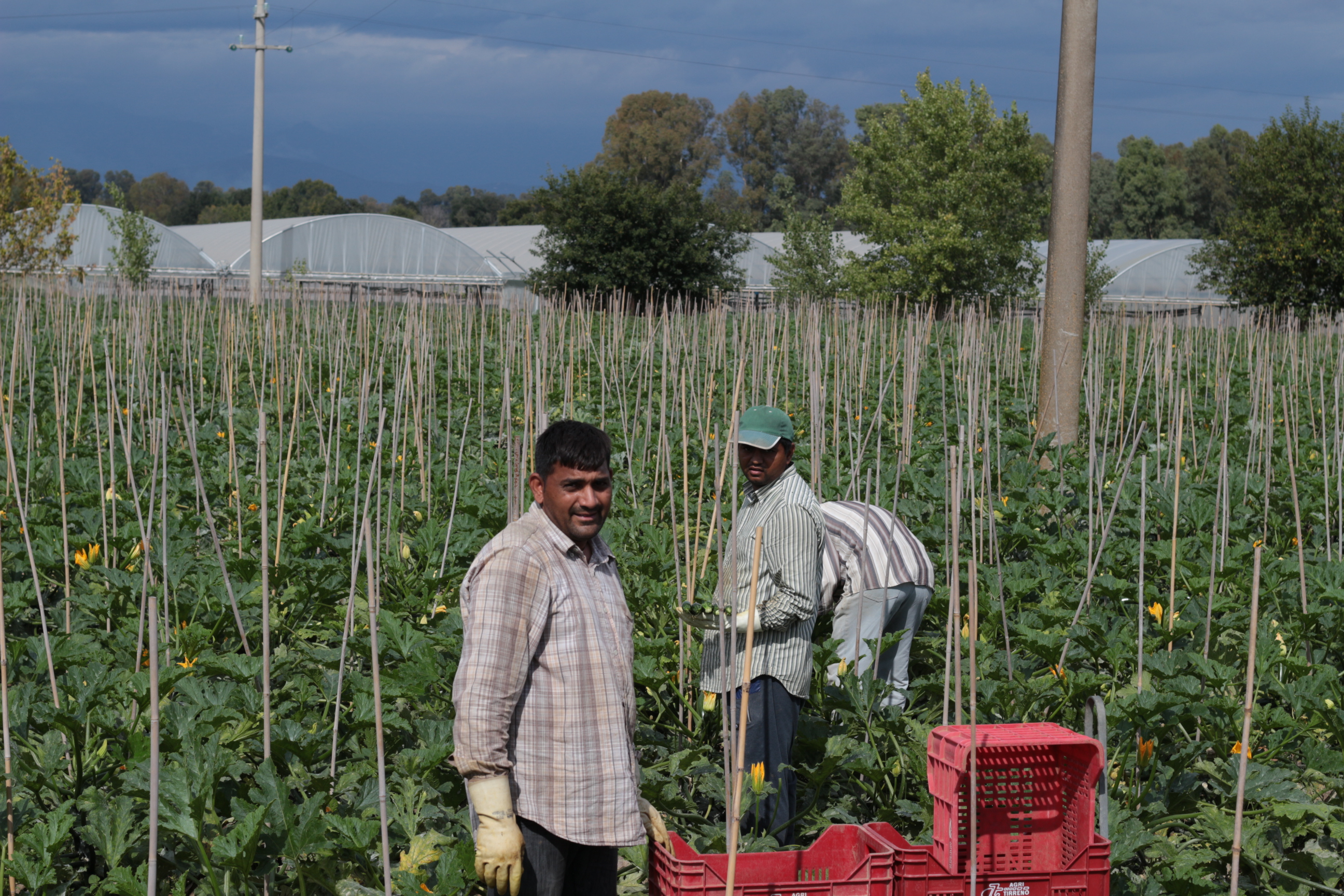Sikh Farmers in the Agro Pontino
by Federico Annibale
22 November 2016

“I used to get paid €3 per hour working as a farmer, but I’ve been fired. I’m looking for a new job in the fields, but it’s not easy right now”, says Alam, a 47-year-old Sikh man, who moved to Italy twelve years ago. Alam lives in the Agro Pontino, a region 90km south of Rome, where the second biggest Sikh community in Italy resides. According to CGIL, the largest Italian workers’ union, approximately 30,000 Sikhs currently live in the area.
“There are around 9,000 farms in Agro Pontino which provide thousands of jobs for farmers”, notes Marco Omizzolo, visiting professor in Migration Studies at Ca’ Foscari University of Venice and president of In-Migrazione, a cooperative lobbying for migrant rights in Italy. “However, this does not necessarily mean good or decent jobs.”
Marco worked undercover on a farm in the area for three months, experiencing first hand how hard it is working in the fields. “The vast majority of Sikhs who live in the area work in the fields, and almost all of them work in degrading conditions. Salaries are well below the legal minimum wage, and there is violence and intimidation towards farmers who rebel. Payment is often delayed, work on Saturdays and Sundays does not receive better pay, and the practice of ‘caporalato’ is widespread”, says Marco over the phone.
‘Caporalato’ is an illegal recruitment practice common in southern Italy (though spreading to the rest of the country), whereby an illegal intermediary is paid by the owner of a farm to find farmers. The practice is associated with exploitation, employment of migrant workers, low pay, minimal workplace security, and tends to be linked with criminal organizations.
Employers also exploit migrants’ ignorance of both the local language and the law. Barba, the vice-president of the Indian Association of the Lazio region, explains: “One major problem for our community is the language – too many of us do not speak Italian, so it’s easy to be exploited. We don’t have the tools to defend ourselves and to react to the abuses we are suffering.” It’s common for Sikh farmers to be paid €3.50 per hour without knowing that the minimum legal wage is almost €9 per hour. “We don’t know our rights, and many of us just accept our lot. If nobody tells us what the law says, how can we know our rights?”
All farmers have regular contracts in which it’s stated they earn the minimum wage. “However, the problem is that the owner of the farm writes down that they worked, let’s say, 10 days a month, for 6 hours a day, when they have probably worked at least 30 days a month for more than 12 hours a day”, says Marco.
He goes on to explain that 70% of Sikh farmers work under ‘ethnic caporalato’, meaning the caporale is Indian and not Italian. There’s therefore a part of the Sikh community that is actively involved in the systemic exploitation of other Indians. “They make money from their own people’s suffering, and then on Sunday, they come to the temple”, Marco laughs.
One of the main driving factors behind Sikh farmers’ horrendous working conditions in the Agro Pontino is the Bossi-Fini immigration law. “Nowadays, if you are a non-EU immigrant who wants legally to come to Italy in search of a job, you need to have a ‘residency contract’. This means that prior to arrival in Italy, a migrant must have signed a contract with an employer. But a worker from Punjab is highly unlikely to know any firms in the Agro Pontino, and so there’s a flourishing human trafficking business from Punjab: Indians need someone in Italy to put them in contact with a firm”, Marco explains.
Travel costs are between €10,000 and €15,000. It works like this: an Italian employer asks an Indian trafficker, living in the Agro Pontino, to find him three farmers. The trafficker speaks with his contact in India, who is in charge of finding people who are willing to come to Italy, and once they accept, the Indian trafficker in Italy provides all the documents necessary to allow the three workers to migrate legally.
“When they arrive in Italy, the situation is radically different from what they have been told”, Marco says. “But they don’t have any alternatives, as many of them have run up debt in India in order to pay the trafficker. Even if the job is awful, and the pay paltry, they are trapped.”
While working at the farm, Marco’s cover was blown, and he faced retaliation. “The tires of my car were burst, and I received several death threats. I decided to leave the area, as I couldn’t live there anymore. The atmosphere was too tense, and I was concerned for my family’s safety”.
Nonetheless, solidarity between Sikh communities in the Agro Pontino is strong. Temples act not only as places of worship, but as social centres where people can eat together, talk about their problems, socialize with the members of the community, and report cases of mistreatment by their bosses. Last April, the first important strike in this area took place. “There were five thousand Sikhs marching in the centre of Latina. Since the strike, some things have improved – some of our people experienced an increase in their salaries. Others, however, were fired for joining the strike. But we won’t stop – we are good workers, and we want our rights”, states Barba.
For many Sikh farmers in Italy, the path to dignity and fair working conditions is still long. As elsewhere in Europe, immigration laws, border controls and institutional racism are the real impediments to migrants’ emancipation.